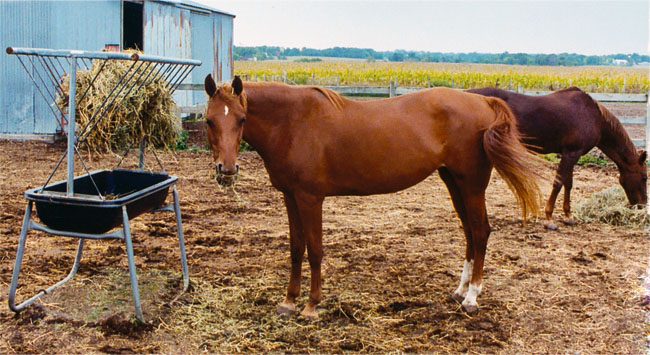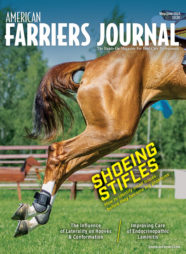Educating horse owners and providing them with information on the latest research findings on the links between equine nutrition and the development of laminitis, may go a long way toward improving laminitis prevention in your client’s horses.
Kathryn Watts of Rocky Mountain Research and Consulting in Center, Colo., who specializes in the dietary management of equine laminitis, has published valuable research data on the links between high-carbohydrate forage, insulin resistance and laminitis in horses.
While laminitis has long been associated with foods that are “too rich,” Watts concludes that this terminology is far too general and vague to provide horse owners with real information that can help in the battle to stave off laminitis.
Dietary, Hormonal Links To Laminitis
The focus of Watts’ research has been a two-pronged attack. The newest studies focus on a horse’s metabolic system and hormonal mechanisms that link intolerance to sugars to laminitis. The other aspect of the research focuses on fructan (a type of polysaccharide) and sugars found in cool-season grasses, which can cause drastic changes in a horse’s gut micro-flora and sets the stage for laminitis. Reducing the sugar and carb content in feed has become an integral component in the battle to ward off laminitis.
And just as it’s now in vogue for overweight human beings to fight the evils of carbs, the battle is now being brought to the horse arena. With lectures such as “Are You Feeding Your Horse Like A Cow,” Watts explains the factors that affect carbohydrate accumulation in forages and offers studies that show methods to decrease these potentially unhealthy risk factors that could lead to an increased chance of laminitis.
Soaking Hay, Water-Soluble Carbs
Simple sugars, disaccharides and short-chain fructan are soluble in cold water, while longer-chain fructans are soluble in hot water. Therefore, Watts studied the ramifications for soaking hay and grasses in water to see if she could reduce the levels of carbs and sugars that may lead to laminitis.
In the study, 15 samples of various kinds of hay including straight alfalfa, alfalfa grass mixes, straight grasses of several varieties, and oat hay were split into groups. They were tested for Water Soluble Content (WSC) before soaking, after 30 minutes in cold water, after 60 minutes in cold water and after 30 minutes in hot water. All soaked samples were dried at 60-degrees C overnight and then re-tested for sugar content.
Watts found that the reduction in sugar content was linear in respect to the amount of time that the samples were soaked:
- The average amount of WSC reduction after 30 minutes of soaking in cold water = 18.9%.
- The average amount of WSC reduction after 60 minutes of soaking in cold water = 30.7%.
- The average amount of WSC reduction after 30 minutes of soaking in hot water = 29%.
It should be noted that there was a fairly wide range in the percentage reduction of sugars depending on the sample type — from a high of 55.9 percent to a low of zero reduction. There is also some correlation based on the age of the hay or grass.
More Study Needed
Watts feels as though she’s close to gaining ground-breaking scientific data on the links between a feed’s carb content and laminitis, but needs to conduct further studies that quantify the findings and better define those hays that may not be salvageable by soaking, as well as more in-depth analysis to insure that other valuable nutrients are not being lost by the soaking process. Preliminary work has shown that appreciable amounts of potassium, which were at excessive levels initially, were the only other nutrients leached by the soaking.
Soaking hay has been reported to be associated with improved soundness in actively laminitic, insulin-resistant horses within 2 to 14 days. But again, Watts stresses that further research is needed. She is actively seeking corporate and private support that will enable her to continue this potentially beneficial research that has far-reaching hoof-care ramifications.
More information on Watts efforts can be found on her Web site at: Safer Grass She can be reached by mail at: 491 West CR 8 North, Center, CO 81125. Phone: (719) 754-1995. Fax: (719) 754-1996. E-mail: kwatts@amigo.net.








Post a comment
Report Abusive Comment